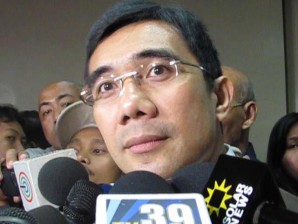JBC may give Aquino up to 5 names

Iloilo Representative Niel Tupas Jr., who represents the House of Representatives in the panel, said he thought the panel should recommend five instead of only three names “to give the President leeway to choose.” INQUIRER.net FILE PHOTO
The Judicial and Bar Council (JBC) may end up recommending Friday day five, instead of the customary three, candidates to President Benigno Aquino from which the latter will choose the next Chief Justice.
Iloilo Representative Niel Tupas Jr. on Thursday admitted to having proposed this to the eight-member body and claimed to have the support “in principle” of majority of the JBC members for his proposal.
Tupas, who represents the House of Representatives in the panel, said he thought the panel should recommend five instead of only three names “to give the President leeway to choose.”
The number just had to be increased because there were so many in the list of 20 nominees who were qualified for the position, the congressman argued.
After two postponements since the start of the week because of the bad weather, the JBC will finally get to vote on the nominees Friday.
Article continues after this advertisementTupas claimed that the panel had the discretion to recommend five names because the Constitution only says that the JBC can name “at least three nominees.”
Article continues after this advertisementTupas said it was even possible they would come up with six names in case of a tie, but admitted that six nominees would be “too much.”
Before the voting, however, Tupas said the panel had to resolve first the problem of four nominees with pending cases—Justice Secretary Leila de Lima, Presidential Commission on Good Government Chair Andres Bautista, Solicitor General Francis Jardeleza, and Securities and Exchange Commission Chairperson Teresita Herbosa.
The council has three options to deal with the issue, he said.
It can disqualify these nominees outright since the JBC rules are clear that they cannot qualify for the Chief Justice position if they have pending regular administrative or criminal cases against them.
Or they can still be considered as nominees if the JBC decides to amend or suspend the rules on the qualifications of nominees with pending cases, Tupas said.
Whether Acting Chief Justice Antonio Carpio will be counted among the nominees with pending cases will not be known as the Supreme Court will only be taking up Friday the disbarment case filed against Carpio by anticrime crusader Lauro Vizconde.
The twice-postponed special en banc session of the high court is finally meeting at 9:30 this morning ahead of the 11 a.m. meeting of the JBC, according to SC spokesperson and lawyer Gleo Guerra.
Lawyer Frank Chavez expressed the hope that the high court would not just dismiss the disbarment case against Carpio as he believes it will do.
Chavez said the high court could very well dismiss the disbarment case because under the Constitution, a high court justice can only be removed from office through impeachment.
“The prudent thing for the high court to do is to endorse it to the JBC and the Integrated Bar of the Philippines (IBP),” Chavez said, noting that this was the route taken by the high court in the disbarment cases against Justice Secretary Leila de Lima.
If the Carpio case is referred to the JBC, the latter would have to decide whether or not Carpio should still be considered for the short list of its nominees to be recommended to the President, he said.
If referred to the IBP, it will be for the latter to investigate the allegations made by Vizconde against Carpio. If it finds that there is a factual basis for the complaint, the IBP can endorse the case to the House of Representatives for impeachment.
Meanwhile, De Lima on Thursday shot down the suggestion that she was President Aquino’s choice for the next Chief Justice.
“I don’t think that’s true. No comment. That’s only speculative,” she said.
De Lima said she was “hoping for the best but expecting the worst” in today’s JBC meeting.
She acknowledged that her chances of being included in the JBC short list became “slimmer” after the IBP junked her petition to dismiss the two disbarment cases against her.
De Lima again protested that the disbarment cases were political in nature and criticized the manner by which the Supreme Court handled them.
She said the high court “sat on” the cases, only to refer them to the IBP “at the last minute.”
“My feeling is I’m being squeezed,” she complained.